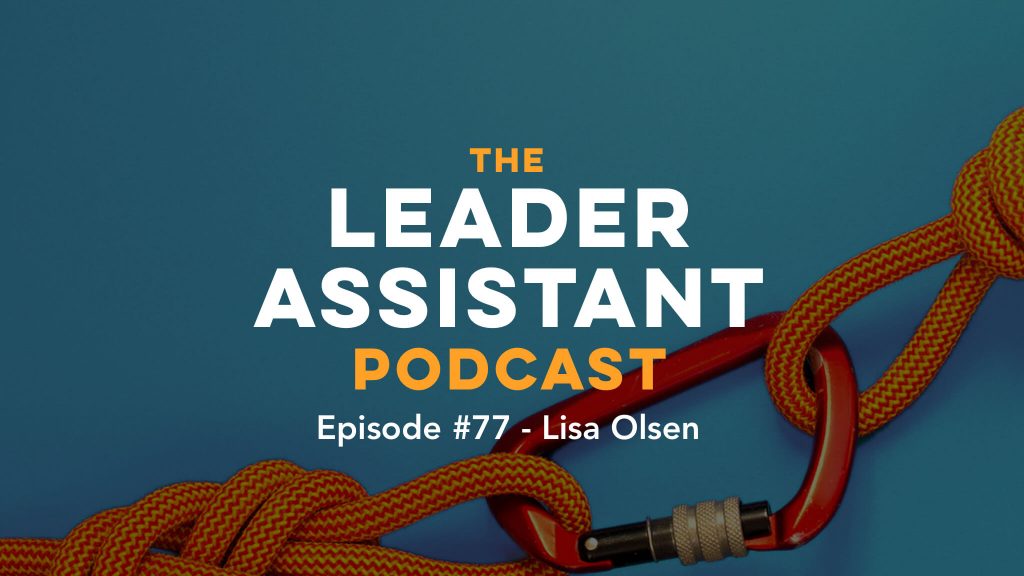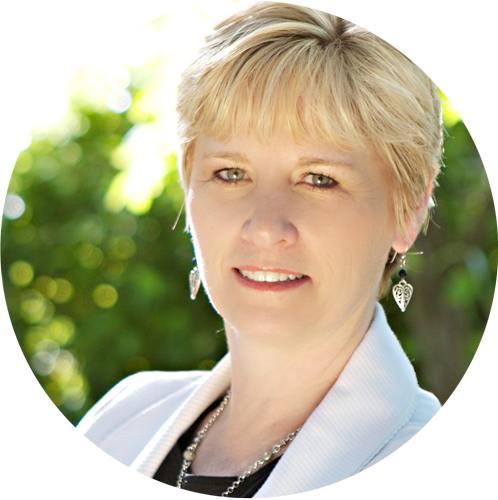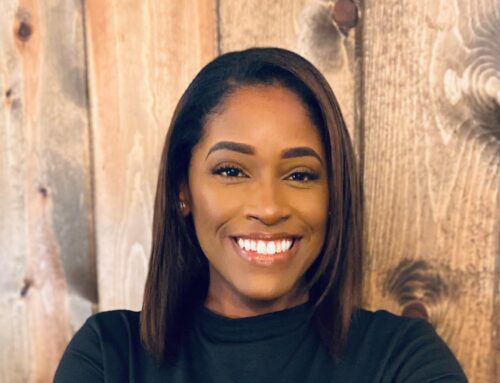Lisa Olsen has a passion for motivating others to be their best. She’s been a senior executive assistant for over 25 years, and is also co-owner of Admin to Admin.
Lisa shares advice on managing an inbox, having the confidence to lead, professional development, and much more. I hope you enjoy our conversation!
LEADER ASSISTANT MEMBERSHIP
Join top executive assistants from around the world who meet for monthly group coaching calls, share resources, and get access to exclusive bonuses within the member community by subscribing to the Leader Assistant Membership.
LEADERSHIP QUOTE
There are five non-negotiable characteristics that every effective leader must have: a sense of calling, an ability to communicate, creativity in problem solving, generosity and consistency.
– John C. Maxwell
CONNECT WITH LISA
ABOUT LISA
Lisa has a passion for motivating others to be their best. An enthusiastic and sought after international speaker and trainer, her presentation style is engaging, educational and motivational. She is the co-owner of Admin to Admin – a training and development company dedicated to helping assistants discover their administrative brilliance.
Her successful career as a senior executive assistant spans over 25 years. An educator at heart, she taught at Shasta College in Redding, CA for 5 years in the Administrative Professional Certificate program. She has been a repeat presenter at the APC Conferences in the US and Canada, the Office Dynamics Conference, the IAAP International Forum, Executive Secretary Live Conferences and the Executive Leadership Support Forums. She enjoys connecting with all the brilliant assistants she has met around the world.
Still working in the administrative trenches, she is currently the Senior Executive Coordinator at Dignity Health, leading a team of 6 as the Office Manager and serving as the Community Board Coordinator as well as supporting the President/CEO of the 6 hospital region.
Lisa has a degree in Business & Human Resource Management and a Masters Degree in Organizational Leadership.
THE LEADER ASSISTANT BOOK
Download the first 3 chapters of The Leader Assistant: Four Pillars of Game-Changing Assistant for FREE here or buy on Amazon here.
JOIN THE COMMUNITY
Join the Leader Assistant Slack Community here, or the Facebook Group here for bonus content and to network with other assistants who are committed to becoming leaders!
SUBSCRIBE
Subscribe to The Leader Assistant Podcast so you don’t miss new episodes!
You can find the show on Apple Podcasts, Spotify, Google Podcasts, Pandora, and Stitcher.
Join my email list here if you want to get an email when a new episode goes live.
LEAVE A REVIEW
If you’re enjoying the podcast, please take 2 minutes to rate and review the show on Apple Podcasts here. Each review helps me stay motivated to keep the show going!
—
EPISODE TRANSCRIPT
Lisa Olsen 0:00
Hello there, this is Lisa Olsen happy to share my favorite leadership quote one of them I have several. This is by John Maxwell. There are five non negotiable characteristics that every effective leader must have a sense of calling, an ability to communicate creativity in problem solving, generosity, and consistency.
The Leader Assistant Podcast exists to encourage and challenge assistants to become confident game changing leader assistants. Thank you so much for listening. Oh, I’m
Jeremy Burrows 0:43
old. Hey, friends, welcome to episode 77. Just a quick reminder to join us in the leader assistant membership subscription, where we have monthly group coaching calls, and then access to the video recordings of those calls in case you want to rewatch or couldn’t join us live. We also have an online forum platform where we share tips and resources and bonus videos and bonus templates, and all kinds of great content to help you be a leader in your role. So it’s $39 a month or $399 for an annual membership. And you can join us at members.leaderassistant.com Hey, everyone, thanks for tuning in to The Leader Assistant Podcast. It’s your host, Jeremy Burrows. And today I’m super excited to be speaking with Lisa Olsen. Lisa is the co owner of Admin to Admin and she’s also senior executive coordinator, also board coordinator and leads a team of six at Dignity Health, Lisa, how’s it going?
Lisa Olsen 1:51
It’s going great. Thanks, Jeremy, nice to be here.
Jeremy Burrows 1:54
And what part of the world are you in right now?
Lisa Olsen 1:57
Right now I am in Sacramento, California.
Jeremy Burrows 2:01
What was your very first job? And what skills did you learn in that role that you still use today?
Lisa Olsen 2:09
Well, if we go way back, I think my very first job was, you know, babysitter. But it is amazing how many skills you use. And then I worked some summers with my mother who actually had a very interesting job. Working at the Embassy of Iraq, I grew up in the DC area. And she actually worked as a very high level executive assistant at the embassy. And so my one of my first jobs, I think that was my first job was I spent some summers there, and did really important work like stuffing envelopes. Doing some odd jobs for her, but it really helped me to learn the ropes from one of the best. So that was probably my first job.
Jeremy Burrows 2:58
So when did you come become a an EA? And did you become an EA partly because your mom was and you kind of respected that and saw that kind of the power or the responsibility that came with that role?
Lisa Olsen 3:15
Well, I think was a little bit of both, I actually always wanted to be a flight attendant, but that never panned out. And so I went off to college and was also was in the nursing program to start. And then I met my future husband and got married. And he was in law school. So I helped support our little tribe. And while he was in law school, so I worked on campus at the college university and at the university there and just really loved the work. I started doing support work there, and just really loved it. No two days were the same. And I felt like it was a really good niche for me. And from there. It’s just, you know, as we moved around, I continued to look for those types of roles. I spent about seven years working in a hospital and medical records. So I learned all about that scope of work, and have spent most of my career in health care, spent a few years in engineering spent a few years in the public, corporate of the public world public agency government. But my expertise is in healthcare, and so it just kind of expanded from there. It’s just an area of work that I’ve always really enjoyed. And then have as my skills have developed, I’ve just sort of branched out and doing done other things I’ve experienced in human resources, of course, medical records, all different kinds of areas. So I you know, I’d have to probably say I fell into it, which is the case with a lot of assistance. Right, we fall into it. And then we just want to hang out. And, and we evolve. And I’ve had lots of wonderful opportunities since then I taught at the college level for a while. And but I’ve always stayed in. I’ve always stayed true blue to executive assistant. It’s in my it’s in my DNA, I think it’s in my blood.
Jeremy Burrows 5:25
Yeah, I fell into it, and then fell in love with it. Pretty much. Yeah, pretty much.
Lisa Olsen 5:29
Well, there are those days. Where I’m not sure I absolutely love it. But definitely, it’s just one of those careers, I think, where you really can make it what you want, right? And, and lots of opportunities come floating by and you can either pick them up and go with them or not, it’s a choice. And I’ve been one of those people that have had lots of opportunities flow by and I’ve been able to take advantage of those opportunities. So it’s worked out well for me.
Jeremy Burrows 6:01
Awesome. Well, do you have any funny or odd or interesting stories of times as an assistant?
Lisa Olsen 6:14
You forget Jeremy, how many years I’ve been doing this. We’ll be here all night with with stories. But, you know, to come to mind very quickly. one’s kind of a humorous one. When I was working early in my career, I was supporting a director, VP of Clinical Services. And he asked me once to get some information from up in administration. And so I called up there and I was very good friends with the colleague with the EAA up there. And so I said, Hey, you know, i Lin, I need this information. I think sister Bridget has it. And do you think you can get that for me? And she said, yeah, do you? You know, do you know exactly what it is? And I said, Oh, sister, Bridget. Yes. She’s not sister Bridget. Her name was Mr. McCarthy, at the time, was sister McCarthy. And it was a Catholic hospital. So I said, Oh, that’s sister McCarthy. She always is needing something. And there was dead silence on the phone, just dead silence. And I went, Oh, Hello, sister. You’re standing right there are you. And she was they were on speakerphone. She was standing right there. And I had sort of, you know, very, just in a fun week sort of been very sarcastic. And luckily, she was very, she had a great sense of humor. And in her Irish broke, she sent me straight, but I’ll never forget that one. Because that reminded me of how important it is to ask first if you’re on speaker. And then the second one is just was years later. And it really, it’s a really great example of and I use this sometimes in my workshops, where, you know, leaving off the names, of course, but about where we, where we know where the line is, of stepping into maybe you know, it’s time to consider going somewhere else. Or maybe you’re doing too much or stepping into a role that could be outside the bounds of normalcy. But I had worked for this gentleman for about 10 years. And we were on a management retreat, and we were all waiting for him to come in to dinner at the resort and waiting, waiting, waiting and all of a sudden the maitre d comes over and says, Is there a Lisa here? And I said, Yes, I’m right here. And the whole management team was there. And it was my boss on the phone. And he specifically asked for me, and he said, I need to go to the hospital. And so of course, he says, You need to come, you know, come and get me. And so I, of course, ran out the door, ran over to his bungalow, where he was his room and knocked on the door. And, you know, I needed I had to drive him to the hospital on the way to the hospital, he had to get sick. When we got to the hospital. You know, the nurse assumes I’m somebody that is related to this person, okay, we need to help him get his clothes off, you know? No, no, no, no, no. So it’s a serious story. And it’s a little bit of a humorous story, but I use that as an example of, you know, it was shortly after that, that I realized it was time for me to consider moving on, because he was so dependent upon me so dependent and felt so comfortable, which I totally be respected. And of course, we don’t really have the time to go into all the onion layers of this. But it was just one of those examples. And one of those stories about, I was more than happy to help. But I also felt like, wow, you know, it’s time to maybe reassess where we are in this executive assistant relationship. So, yeah,
Jeremy Burrows 10:25
yeah, I had a similar experience with my prior executive. And it was kind of like a very, I was very lucky to have a good relationship where I could support in so many different ways. But yeah, it kind of there were times where it came to the point where I was like, You know what, this is probably just a little too much. It’s too dependent. Yeah. Like you said, and so yeah, it’s definitely, sometimes it takes crazy moments like that to wake us
Lisa Olsen 10:54
up. Yeah. And it’s very individual. And it’s very personal. Yeah. You know, and everybody has to, you know, from that I kind of came up with this list of, of things, you know, that I share in, you know, with other assistants. And, you know, how do you you know, I mean, that’s really the question that comes out of that example. Right. And those stories, right, Jeremy, is that, you know, how do you know when it’s time to move on, and I could have very easily stayed and continued and kept on, you know, going and probably been very, everything would have been fine. But for me, personally, it was a it was a very personal thing that I needed to come to terms with. So yeah, it’s certainly a great discussion topic.
Jeremy Burrows 11:37
So what about let’s talk a little bit about a couple of practical tips. So how about managing an executives email inbox? What’s your number one tip for?
Lisa Olsen 11:49
Don’t Don’t do it. That’s my tip. And you know, this is really interesting. I’m really glad you asked this question, Jeremy. Because this comes up a lot, doesn’t it then? And I think sometimes there are some assistants who feel like they are less than if they’re not managing their executives inbox, right? Like, oh, it’s the end all of being a top level assistant, if you are managing your executives inbox, you know, I do manage and triage my executives inbox. But, you know, before I answer that question of what my tip is, I just want to put that out there that I, you know, I, I don’t think every assistant should feel like they’re not a cut above, if they are not managing their executives inbox. There are some industries, there are some businesses, there are some things you know, that executives do, where sometimes they, it makes sense not to have their assistant manage their inbox. So anyway, always throw that out there. My tip is, you know, I have several of them. But I think for me personally, my tip is not to get too caught up in worrying about what they’re sending, but more about what’s in the inbox and getting rid of the junk. When you’re new to a job and new to supporting an executive one and you are going to be supporting and triaging their inbox, the number one thing you want to do is who are the top 10 people, you know, that they’re going to get emails from? And what are the periodicals? What is the junk and be paying attention to that over a short period of time, you know, like, 30 days before you start doing anything. And I learned that the hard way, trust me. You know, I worked for an executive, I think the first executive and I started doing their email for and, you know, I just went there was just starting to delete things that I thought were junk. Well, that was bad. That was wrong. Because I hadn’t taken time to look at their inbox kind of pay attention to watch what she was deleting and keeping. So I think one tip is to is to get familiar, obviously, and don’t make assumptions about what you think might be important, and what they think might be important. And I don’t have my executive inbox open all the time. I triage it may be four times a day, because otherwise, I might drop balls in my own inbox, and of things that I need to be doing to support her. So that that’s an interesting point, right? Because if I’m always in her inbox, I’m gonna miss stuff that’s in mine, that will help her to be more productive. So I have, you know, reminders in my on my calendar to triage her email about four or five times a day.
Jeremy Burrows 14:53
It’s great. Yeah, it’s definitely a common question that I get. In fact, yeah. Right before we started recording, I got a LinkedIn message from someone saying, hey, you know, thanks for the podcast, do you have any resources on managing an inbox for your executive? That’s funny. Yes. Because I think I’m gonna ask questions.
Lisa Olsen 15:16
I mean, I don’t, you know, I don’t move things into folders. I mean, she has folders, you know, but the only time I’ll do that is if she’s on vacation and going to be gone for an extended period of time. She was, she was in Rome for about a month last summer. And during that time, I did set up some folders for myself and move some things into folders, and did do some responding on her behalf. But other than that, you know, I knew she was kind of checking periodically. So you just have to be careful, right. And I think the most important tip with managing an executive executives inbox is to know your executive. Right? You got to know your executives preferences. Yeah. And what’s important to them? That’s the most important tip, I think.
Jeremy Burrows 16:03
Yeah. Okay. So what’s the number one struggle that you’ve had as an assistant and that you’ve see other assistants heading?
Lisa Olsen 16:16
Well, I mean, that’s kind of a two fold question. I’ve been, I saw that one. And I, and I’m just sort of, I think there’s they’re two different questions. What’s the number one struggle that assistants have? To me, I think that’s different than the day to day struggle that I might have. I think, if I were to answer the question, what’s the number one struggle assistants have? I would say it’s, it’s really not understanding how they individually can make a difference and contribute. You know, I think, of course, in today’s world, we could say things like, oh, keeping up with technology or managing my executives inbox, but yeah, though, but those are all things that we that we do. I think assistants today, the number one struggle we have is, you know, is evolving ourselves, staying up to date with having self awareness about how I am perceived. And we’ll touch a little bit more about that, I think later on. But you know, as far as a day to day struggle, that that changes daily. Right? You know, one day, it might be the fact that your whole computer system is down right now, here in California in our area, this is a really interesting, we have something we’ve had to deal with. But we’ve got power outages, one of our one of our six hospitals has been completely running on generator. So that’s a struggle that I’m dealing with right now. Right. So they’re, they’re I think there are two different questions. Really, Jeremy, you know, that the struggle with the, with the perception of the role? If that’s one question, or the day to day struggle that we have two different things?
Jeremy Burrows 18:10
Yeah. What is a tip for the executives listening, that you would give to help them get more out of their assistance and really utilize their assistance more
Lisa Olsen 18:22
for executives? You mean? Yeah. Again, you know, I’m gonna go back to executives will, executives will put as much trust and lean into their assistance, as their assistants will demonstrate. So what I mean by that is everything that I do as an assistant, everything that my executive gives to me or puts trust in me, how she utilizes me, and this is the case with every boss I’ve ever had is up to me. Sometimes, you know, we I think we focus too much on well, how can we get executives to give their assistants more work. In fact, I saw something come across a Facebook feed earlier today about that. Something about how their executive doesn’t keep their meetings doesn’t respect their time. That’s up to me on how I manage that how I demonstrate the value that I’m going to bring to my executive that starts with me and how I carry myself how I manage myself, my self awareness, my critical thinking skills, how I advocate for the role all of that you can just like throw all of those that into a bucket. And you know, to me, that’s that’s the message when I first came here to this position that I have now. The team was was a little was very siloed. very siloed very task oriented. And I’ve never worked that way, and so on. That’s how and that’s what’s interesting about your question here is that the the executives, that’s how they treated those assistants, you know, schedule this meeting or do this lunch, do this do that those are all tasks, right? There was no, there was no connecting, connecting, there was no strategy, there was no synergy there was no you can use every buzzword you want, there was none of that happening. And so I saw very quickly that that was an area that really needed some work. And so I have always been the type of assistant that has walked the professionalism that this career deserves. And so then that is how I am perceived. If that makes any sense. So then that’s how my executives utilize me. Right? I don’t wait for them to say, oh, I want you to do this, or I want you to get involved with me strategically. No, it’s the it’s the other way around. How how much my executive uses me strategically is completely up to me.
Jeremy Burrows 21:21
Yeah. What would you say to assistants listening who kind of lights a fire for them what you just said, but they struggle with confidence, they just don’t have the confidence to, you know, ask their executive or, or, or tell their executive? What’s your encouragement and challenge to those listening?
Lisa Olsen 21:49
Well, I’m not even sure it’s about and that’s the interesting thing, it’s not so much about asking, you know, I’ve never really asked my executive or gone in and said, Hey, I want you to, you know, get me involved in this or that. I think if they’re if assistants are lacking confidence, there’s a couple of different things I might suggest one, Shadow, or get another EAA that you feel like has those qualities that you want to emulate, and shadow them, or have them be your mentor, or go to lunch with them and pick their brain or get involved in a committee or do volunteer yourself to maybe show how to do something in a lunch and learn for your assistance, there’s such there’s a plethora of different things that assistants can do to get that started. In other words, if they’re lacking confidence, you don’t necessarily want to say, Okay, go into your executives office and say, or do this, that might be jumping the gun a little bit. But what you can do is give yourself opportunities, they can give themselves opportunities to practice those types of things by, you know, if there’s a higher level EA, that they really feel like man, he or she has a lot of confidence, buzz them up, call them up and say, Hey, I’d like to spend some time with you. Can you? You know, can I pick your brain? Or can you help me to, you know, give me some ideas or suggestions on what I can do? Yeah, I think there’s a lot of self awareness involved in in this role there has to be, and you got to be willing to peel back some onion layers. And be really honest with yourself about the whole confidence thing. Confidence comes from recognizing that you do have what it takes to be a successful EA. But you got to do the work. Right? It’s not just going to come in a FedEx package on your front doorstep. You know, you’ve got confidence, right? You got to do the work, you’ve got to do the things maybe join Toastmasters maybe, you know offer to, like I said get get involved in a lunch and learn take every opportunity to build and strengthen that competence.
Jeremy Burrows 24:15
So on that topic, what is maybe one book or resource that you would recommend to assistants who want to develop their skills?
Lisa Olsen 24:24
Wow. So so many, you know, we have so many resources now than we did when I first started in the career. There’s so many fabulous webinars, obviously your great podcast, great books out there, I would suggest going to success.com success.com There’s a great that’s a great magazine, but they also have a book reference and there’s all kinds of great books. I always recommend the book crucial conversations because I think one area that assistants do struggle with is having those crucial Conversations, you got to know how to have them, you’ve got to know how to understand communication styles. And so crucial conversations is one that I always recommend. Yeah. But you know, I just think sometimes finding a mentor or finding a job shadowing another EAA. That’s one of the best ways. That’s, that’s what I did early in my career. And I took some classes, you can take classes at a community college, there’s a myriad of things, you know, that you can do now to grow your your skills. I think the one danger that we have, is when assistants feel like they don’t need any more training, or they don’t need any more growth. And I’ve been around those kinds of assistants and they get complacent, right? There’s no, there’s no place for complacency. When you are an EA. In fact, the more the higher up you go, the more approachable you should be. In my it, that’s in my, in my humble opinion. You really, when you get to the point where you feel like you have nothing left to learn, or nothing left to teach, that’s a real dangerous place to go. So, yeah, definitely. Yeah. So no matter you know, no matter where you are in your career, there’s always, always something new to learn. You know, I consider myself to be a very highly I don’t even know if skilled is the right word proficient, maybe, or professional assistant, but oh, my gosh, I’m still reading the books. I’m still, I’m still listening to the podcast, I’m still going in conferences, you know, even though I speak at them and do training myself. It’s, I don’t speak on anything that I haven’t either experienced myself screwed up on myself. or want to learn myself. So yeah, it’s there’s always things you can you can do to increase your skills.
Jeremy Burrows 27:07
So speaking of speaking, could you just talk for a minute about why you decided to start training other assistants?
Lisa Olsen 27:18
Oh, interesting story. Yours once upon a time. Way back when I was on the AAPC, Administrative Professionals conference Advisory Council, I used to attend as an attendee, and then learned about the Advisory Council and so stepped onto that. And as part of that, at the time, they asked four of us on the Advisory Council at that time to do a concurrent session at that year’s APC. And I’m not going to tell you what the year was, but it was like a long time ago. And so from that, I guess, my evals came back. Strong, which was wonderful. And so they asked me the next year to do one on my own. And so the topic resonated, I guess. And so from there, I realized, wow, well, maybe there’s, you know, that’s something that I could, that I could do to share my, you know, passion for this career. And so from there, I did started doing things at work, I had done some training at work already with our orientation program. So I’ve had some experience. But from there, I, you know, took some classes, I went to Toastmasters, I, you know, got some mentors, fabulous mentors, went to some training, you know, train the trainer type things. And it just has evolved. And then I then I started getting invites to speak and do training by word of mouth. And it’s just, it’s just gone on from there. And I’ve really been grateful for the opportunities that I’ve had to do, you know, on site training at corporations, and then speak at pretty much all of the conferences that are out there, and they’re all wonderful. They all offer something terrific. There’s such a great menu now, of resources out there. Some people don’t like the big conferences, some people don’t think you get a whole lot of value out of the big conferences. I don’t know if I would agree with that. 100% I think there’s something for everybody right now. And so what assistants need to be doing is their homework, right? They need to know what areas they need to fill gaps in, and then look for those opportunities, smaller conferences, larger conferences, whatever it might be that help them to bridge their own gaps. Yeah.
Jeremy Burrows 29:56
Awesome. Yeah. So what would you say is your are kind of maybe 32nd pitch on, what makes your perspective on admin training world unique? In other words, if somebody says, hey, you know, we’re considering you for speaking at our event for assistance, why should we? Why should we choose you? What’s your 32nd? Pitch? Elevator Pitch?
Lisa Olsen 30:18
Oh, gosh, you know, I think it’s because I’ve evolved with it. I’ve evolved with the role. And I’ve supported at all levels. And I’m still in it, you know, I’ve stepped into management, I lead teams. And I have a unique perspective, Jeremy, I think my perspective is a little unique. Because my feeling is the, and I speak to this when I was just at up in Washington, doing something and sometimes I start jumping up and down because I, I get so excited about it. But you know, I was talking about how we, if we wanted, I asked her, I asked a question, you know, what, are their stereotypes still out there with this career? And of course, everybody goes, yeah, there are. And I go, whose responsibility is it to, you know, smash those stereotypes? And they all kind of look at me with this deer in the headlights, you know, like, Oh, it’s my bosses, we don’t get value in the workplace. No, it’s, it’s, it’s ours, it’s mine. The administrative culture, you know, will change one admin at a time. And so my, I think my unique perspective in this world of, of trainers and speakers is I understand the world of the EAA very, very well. And I understand that, that my personal success in it has come from how I advocate for the role myself. In other words, how I promote the role, how I speak about the role, how I navigate the role, how I walk the talk, and, you know, walk into an office with my shoulders back in my head, hi, because I’m an EA. And I believe in it, and I believe that it’s a career. It’s a valuable career. So I think that’s sort of what’s what sets my message apart a little bit. I really like speaking about things a little bit higher level stuff, like emotional resilience, as opposed to emotional intelligence. I like speaking about leadership, for the EAA. There’s just so many I studied leadership, that was my area of focus in grad school, and there’s so there’s so much room for growth in that area for EAS. And empowerment. Empowerment is totally misunderstood. In in the EA world? I think. So lots of room for stuff. Yeah, get all excited and
Jeremy Burrows 32:56
say the elevators on the 17th floor now. That’s right. That’s right. I always liked rooftop bars. So Okay, speaking of leadership, let’s wrap it wrap it up with the final question, what makes an assistant a leader?
Lisa Olsen 33:12
What makes an assistant a leader, what makes an assistant a leader is a willingness to see others succeed. Um, a lot of assistants, the more successful they are, the higher up they go, they start putting criminal tape around their desks or their cubes or their offices. And get they forget that if you want to be seen as a leader, you help others succeed. You give others the opportunity to learn from you. I know from my team, in that sense of being a leader, I try and lead from behind. I give them opportunities to shine. I give them credit, when when the credit is is due. Leadership is all about helping others lifting others along the journey. And that’s, that’s really important to me.
Jeremy Burrows 34:14
Well, Lisa, thanks so much for taking time out of your day, to share your tips and wisdom and insight and just really appreciate you doing this. Where can we find you online? And where can we support?
Lisa Olsen 34:29
Yeah, you bet. You can find me at least at admin to admin.com or our website at WWW.admintoadmin.com We’ve got a couple of fun things coming up. Yeah. So that’s where people can reach out and thanks so much for the opportunity. I am a very passionate EA myself as I know you are and it’s a great career to be in right now. Totally.
Jeremy Burrows 34:55
Yes, it is. Yes, it is. Well, thanks again and we will talk soon and see you soon.
Lisa Olsen 35:00
Awesome. Thanks so much.
Jeremy Burrows 35:01
Thanks again Lisa. You can check out her website and get in touch with Lisa via the show notes at leaderassistant.com/77. Talk to you next time
Lisa Olsen 35:22
please review on Apple podcasts. Please leave you on Apple podcasts. Goburrows.com







